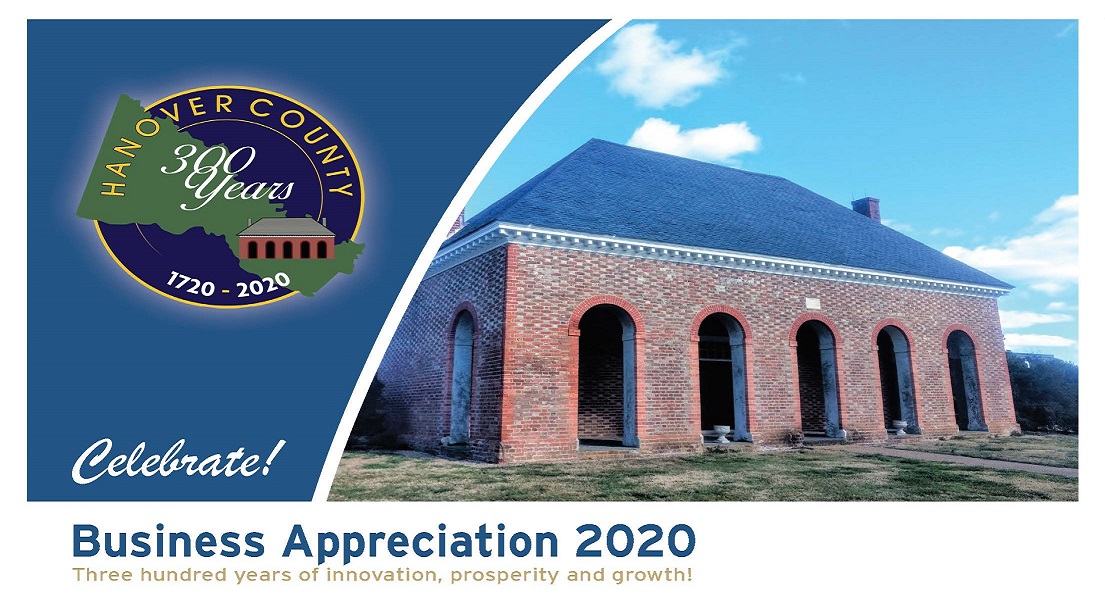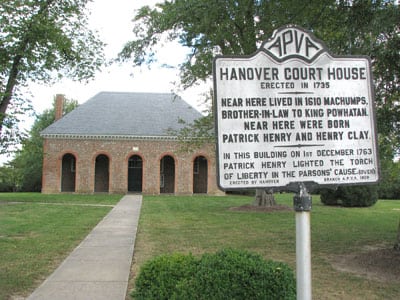Hanover’s Perspective
Historic Hanover Courthouse – The Iconic Symbol of Hanover County, VA

To commemorate business appreciation during the 300th anniversary of Hanover County, the Department of Economic Development is recognizing the county’s tourism and hospitality industry featuring historical, cultural, leisure and entertainment entities and businesses. Hanover’s tourism assets contribute a significant amount to our local economy with visitors spending over $258 million and generating over $5 million in additional tax revenue in 2018.
As this series concludes with the Historic Hanover Courthouse, an iconic symbol of Hanover County, we thank you! We hope this series provided information and inspiration to support local businesses and enjoy all that Hanover has to offer! We appreciate all that our businesses and organizations do to make Hanover a wonderful place to live, play, learn and visit! Also, check out our apps: “See and Do In Hanover County” and “Food & Beverage Establishments in Hanover County“.
Thank you to The Hanover County Historical Society for sharing this article.
The Historic Hanover Courthouse is the third-longest continuous-use courthouse in the United States, after only the King William County Courthouse (1725) in neighboring King William County, and the Old Salem County Courthouse (1735) in New Jersey.
Hanover County, Virginia was founded on November 20, 1720. The county’s first courthouse was located on the plantation of Robert Jennings, Jr., where it operated from around 1720 to 1738. Though this was close to the current courthouse, it’s exact location has been lost to history.
Though the stone above the Historic Hanover Courthouse’s center arcade clearly states that it was Built in 1735, this is today thought to be when the courthouse was first proposed. It was built from about 1738 to 1742, likely by James Skelton. Skelton was Hanover County’s Sheriff in 1739, and went on to work as a contractor on the State Capitol in Williamsburg in 1749.
The property on which the courthouse was built was owned by William Meriwether, Justice of the Peace of Hanover County. Meriwether set aside several hundred acres to serve as courthouse property, though the land and the courthouse itself remained private property until 1752, when it was sold to the County Justices.
What was perhaps the Historic Hanover Courthouse’s most significant event took place in 1763. Patrick Henry (1736-1799), at the time a Hanover attorney, argued a case known as the Parsons’ Cause at the Hanover Courthouse on November 5, 1763.
By colonial law, Anglican Clergy serving in Virginia were to be paid with a certain amount of tobacco every year. When poor tobacco harvests led to inflated prices at the end of the 1750’s, Virginia legislators made an effort to reflect this in their payments to the Clergy, but British monarch King George III refused to allow any such alteration.
In April of 1762, Anglican Reverend James F. Maury of Louisa County filed suit in Hanover to recover back wages from the Sheriff of Louisa County. The court found in the Reverend’s favor, but in the “award phase” of the trial Patrick Henry argued that King George III and the state-supported Church were tyrannical: And while damages must be awarded in this case to the Reverend, they need not be more than a farthing. The jury ultimately awarded only one penny in damages. This legal dispute is widely considered to be an important event leading to the American Revolution.
The troops of three armies passed by the Courthouse on several occasions during the Revolutionary War, as well as George Washington, the Marquis de Lafayette, and British General Lord Cornwallis. Those of means stayed at the Hanover Tavern across the road from the Courthouse, which dates to 1733.
While there was no recorded fighting at Hanover Courthouse during the American Revolution, the Courthouse appears to have sustained some damage. In 1790 the General Assembly of Virginia proposed moving the Courthouse to the western end of Hanover County, but local citizens successfully protested this change, citing recent expenditures of around 300 pounds to both construct a new jail and repair the existing Courthouse.
The Civil War brought conflict back to Hanover Courthouse. The Battle of Hanover Courthouse, on May 27, 1862, brought heavy skirmishing through the Courthouse area, and when Union forces returned at the end of May 1864, they imprisoned Hanover County’s Clerk of Court.
The county’s court records were shortly thereafter boxed up and moved to Richmond for “safekeeping,” which proved to be a poor decision indeed when much of Richmond was burned to the ground in April of 1865 by the retreating Confederacy. Hanover is considered a Burned Record County, as most of its pre-Civil War court records were lost in the blaze.
Though the Courthouse today retains much of its 18th century outward appearance, with original materials still comprising some of the exterior brickwork and roof, the interior of the building was almost completely remade during a 1950’s restoration. The stones in the courthouse’s piazza (front porch) are likely those from Bristol, England, which had originally paved the floor of the courthouse’s public area.
Hanover County’s Courthouse Green, with the Courthouse, Old Stone Jail, Clerk’s Office and Hanover Tavern across the road, is one of very few such complexes in the nation to have retained its historical integrity and perspective.
 The Historic Hanover County Courthouse was still being used to try overflow cases into the 21st century, until recent additions to the county’s courthouse complex. Now the Courthouse’s “continuous use” status is maintained by an annual official ceremonial court function. Couples are still occasionally married in the Courthouse by a magistrate, and it is open for tours on the second Tuesday of each month, from 10am until 2pm. (Note: Tours may be modified or suspended during the pandemic.)
The Historic Hanover County Courthouse was still being used to try overflow cases into the 21st century, until recent additions to the county’s courthouse complex. Now the Courthouse’s “continuous use” status is maintained by an annual official ceremonial court function. Couples are still occasionally married in the Courthouse by a magistrate, and it is open for tours on the second Tuesday of each month, from 10am until 2pm. (Note: Tours may be modified or suspended during the pandemic.)
Nearby: Hanover Tavern, Hanover Café, Carrie’s Kitchen & Tap, Kings Dominion, Town of Ashland, Doswell, Lake Hanover Nature Trail, Courthouse Park, Signal Hill Memorial Park, Hanover Wayside Park

